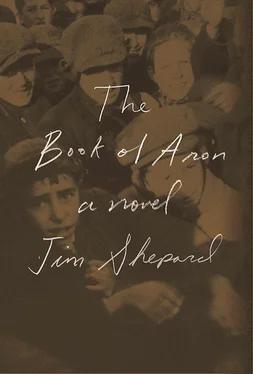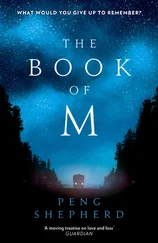I couldn’t even do that right, I thought later. I sat on the sidewalk with my back to the wall. People stepped over my legs.
At curfew someone lifted me off the pavement. I was dozing and shaking from the chill. I was carried many blocks and then down some steps to the basement of a bombed-out house. The room where I was laid down onto a cot was very bright and all around me was noise and confusion. There were bunk beds made from rough boards against the walls. The place was filled with kids on the floor and on the bunks and all of them were dirty and all of them were making noise. Some were playing cards and others were playing with knives. No one seemed to be supervising them.
I couldn’t feel my feet. “This one’s in a bad way,” the man who’d been carrying me told someone else, and I recognized his voice. “This is a satellite shelter,” he told me when he saw that I was awake. “A place people can go who need to get off the streets for curfew. You can have a little soup and warm up and then tomorrow you can go home.”
“I don’t have a home,” I told him, and Korczak looked at me like he’d already known that was what I was going to say.
“Well, then, we’ll have to think about adding you to our little group,” he said. And the kids on the bunks made loud sounds of protest, to make it clear that was the last thing they needed.
THE REAL ORPHANAGE WAS NICER THAN THE shelter but the kids were the same. It was on Sienna Street facing the wall, as far south as you could go. One of the kids said they’d had to move again in October when the ghetto had gotten even smaller. Korczak and the heavy woman Stefa washed me. He said while they were doing it that he’d never seen such a dirty chest and armpits.
Everyone slept on the first floor in one big room and in the morning wooden chests and cupboards were dragged around, mostly by the heavy woman, to make areas where we could eat and study and play. She told the kids to help and some would and some wouldn’t. All of this went on while I stayed in bed, watching. “Who is he, the Prince?” another kid asked, and Korczak told him I was recovering from frostbite.
My feet were burning and while she was sliding a cupboard over near me the woman said I should set them in a pan of cold water, but she didn’t make me so I didn’t. I only got up for lunch and dinner and when I did it made my feet burn even more. Lunch was a wheat porridge ground up in a meat grinder and then steeped in boiling water and dinner was potato skins mushed into patties and pigweed with turnips. While the kids at my table ate they sang Julek and Mańka went out of town and kissed so hard the trees fell down .
“Who weeps at turnips?” a kid said when he saw what I was doing. But I was seeing Lutek still hanging onto his sack in the back of the blue policeman’s car.
“My eyes do this,” I told everyone at the table. “I don’t know why.”
After lunch there’d been a class in Hebrew in a corner of the room near my bed. I pulled the covers over my face. Korczak asked questions in Polish and the kids answered in gibberish. Sometimes he corrected them. His last question was “Are you happy here in Palestine?” and it sounded like everyone had the right answer. The woman said it was time for chores and I could hear everyone getting to their feet and when I pulled the covers down kids were sweeping the floors and washing the walls and wiping the windows. Everyone was calling for something and banging around and knocking into things. When that was finished they all came back near my bed again, and Korczak said it was time to read his column in the orphanage newspaper. This week’s column was called “Take Care with the Machine.” “The machine doesn’t understand; the machine is indifferent,” he read. He had his glasses on the end of his nose and used his finger to follow the print. “Put your finger in, it’ll cut it off; put your head in, it’ll cut that off too.” I got up to pee. My feet weren’t burning so much.
The toilet was in the back behind the kitchen. There were eleven kids in line for it. “Is this the only toilet?” I asked.
“This is the only toilet,” the kid ahead of me said without turning around.
Going back to bed I stopped at the window. It was bright outside. The sun had dried dead flies on the windowsills. The bricks under the sills moved like loose teeth where the mortar was gone. Magazine photographs tacked below were so speckled with holes they must have been targets for wall games.
The kid who’d been in front of me in line spent the rest of the afternoon sweeping the top step of the landing. I watched him. He kept his eyes on me while he worked. When he wasn’t sweeping he waved a hand around his face like a horse shoos flies away with its tail.
He had the cot next to me and shook me awake for breakfast the next morning. We had hot water and saccharine and bread. You could eat three pieces if you wanted. We got in line to be weighed and measured afterwards. While I waited a cripple in front of me waved his stump at me like a fin.
I was back on my bed looking at my feet when the kid with the broom carried over a pan of water filled to the brim and spilled some of it setting it on the floor next to me.
“Madame Stefa says to soak your feet in this,” he said.
“What’s floating in it?” I asked.
“How would I know?” he said.
I asked his name and he said Zygmuś. He said he’d banged his hand. While I soaked my feet he watched the blood swell along his fingernail and wiped it off on the floor, leaving red smears.
The heavy woman asked from across the room if there wasn’t something he was supposed to be doing and he told her he was helping me.
He introduced me to the kid two beds over. The kid was Mietek from the Chłodna Street gate but he acted like he’d never seen me. Zygmuś said they were best friends but the kid didn’t look up and just sat on his bed staring at his rotten boots.
I asked what was wrong with him and Zygmuś said the kid’s mother had been sick but had promised him she wouldn’t die until he was safe in the orphanage. Then she died as soon as he got there.
“Pan Doctor says he’s suffering from pangs of conscience,” Zygmuś said. The kid didn’t seem to hear.
The joke around the orphanage was that no one had ever seen the kid smile, Zygmuś said. The kid said without smiling, “That’s not true. I smile all the time.” Then he turned away from us.
“What’s he holding on to?” I asked.
“That’s his dead brother’s prayer book,” Zygmuś said.
The heavy woman finally got him working and I sat there soaking my feet. I was happy I was warm and not on the street. Later Korczak stood over me and gestured at the pan and asked to take a look. He had this expression like he knew what needed to be done but was being prevented from doing it. His glasses had thumbprints on the lenses. A kid who was six or seven kicked down some girls’ toy city in the play area and they all started yelling and crying.
“Is that Jerzyk?” the heavy woman asked him from across the room.
“That’s Jerzyk,” he said to me like we were sharing a secret. He lifted my foot out of the pan and squeezed my toes. He said, “For two years he’s been making my life miserable. He made everyone miserable in kindergarten. I wrote an article about him that advocated penal colonies. And he’s so young, yet! Imagine what’ll happen when he’s grown.”
Two of the older kids took Jerzyk by the arms and pulled him away from the girls. Korczak decided my feet had healed enough for me to work and told the heavy woman so and she came over and gave me the job of the chamber pots, which she said had to be rinsed with ammonia. She called it starting at the bottom. I asked why they needed chamber pots when they had a toilet and she said that one toilet served a hundred and fifty children and twenty staff members. She also said that if I was finished asking questions, then this might be a good time to start earning my keep.
Читать дальше












